

Dark-Money Groups: Hey, We're Just Like '50s Civil Rights Activists in Alabama! Gene Herrick/AP What do billionaire brothers Charles and David Koch have in common with civil rights pioneers of the 1950s?
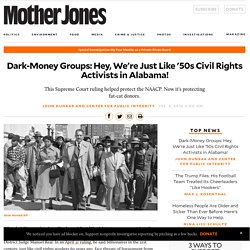
More than you might think. At least according to US District Judge Manuel Real. In an April 21 ruling, he said billionaires in the 21st century, just like civil rights workers 60 years ago, face threats of harassment from those who disagree with their views and should therefore be entitled to privacy when it comes to disclosing certain kinds of information to the government. In 1956, when Alabama was the scene of bus boycotts, lynchings, and a burgeoning civil rights movement, state Attorney General John Patterson sued the NAACP for failing to file papers that were required for "foreign corporations" to do business in the state.
The civil rights organization was held in contempt and fined $100,000 for failure to produce the information, and when it appealed the judgment, the Alabama Supreme Court denied it a hearing. Campaign finance reformers agree. Review: Jane Mayer’s ‘Dark Money,’ About the Koch Brothers’ Fortune and Influence. Photo When Jane Mayer published her 10,000-word article about Charles and David Koch in The New Yorker in August 2010, David Koch denounced her piece in print and, as she reports in her new book, “Dark Money: The Hidden History of the Billionaires Behind the Rise of the Radical Right,” a “private investigative firm with powerful political and law enforcement connections was retained.”
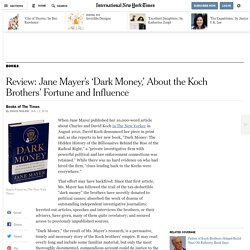
While there was no hard evidence on who had hired the firm, “clues leading back to the Kochs were everywhere.” That effort may have backfired: Since that first article, Ms. Covert Operations. On May 17th, a black-tie audience at the Metropolitan Opera House applauded as a tall, jovial-looking billionaire took the stage.
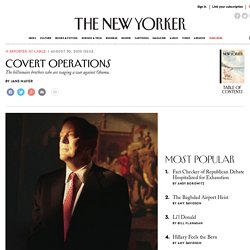
It was the seventieth annual spring gala of American Ballet Theatre, and David H. Koch was being celebrated for his generosity as a member of the board of trustees; he had recently donated $2.5 million toward the company’s upcoming season, and had given many millions before that. Koch received an award while flanked by two of the gala’s co-chairs, Blaine Trump, in a peach-colored gown, and Caroline Kennedy Schlossberg, in emerald green.
Dark Money review: Nazi oil, the Koch brothers and a rightwing revolution. Lots of American industrialists have skeletons in the family closet.
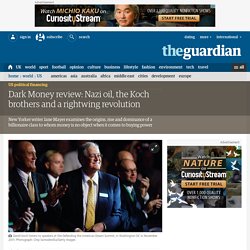
Charles and David Koch, however, are in a league of their own. The father of these famous right-wing billionaires was Fred Koch, who started his fortune with $500,000 received from Stalin for his assistance constructing 15 oil refineries in the Soviet Union in the 1930s. A couple of years later, his company, Winkler-Koch, helped the Nazis complete their third-largest oil refinery. The facility produced hundreds of thousands of gallons of high-octane fuel for the Luftwaffe, until it was destroyed by Allied bombs in 1944. In 1938, the patriarch wrote that “the only sound countries in the world are Germany, Italy and Japan”. These are just a handful of the many bombshells exploded in the pages of Dark Money, Jane Mayer’s indispensable new history “of the billionaires behind the rise of the radical right” in America.
Twenty years after collaborating with the Nazis, Fred Koch lost none of his taste for extremism. The Koch brothers’ impact on the American political system. Tom Hamburger is a Washington Post reporter covering the intersection of money and politics.
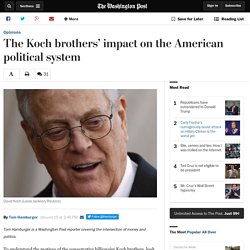
To understand the motives of the conservative billionaire Koch brothers, look to their childhood — and what a rigid, harrowing youth it was, according to a new book by New Yorker writer Jane Mayer. In “Dark Money,” Mayer relies on interviews and previously undisclosed documents to trace a family fortune that was built in part on business ties with the Third Reich, and an early childhood colored by a fearsome German governess and a strict, demanding father who favored corporal punishment.
She obtained a confidential history of Charles Koch’s effort to shape American politics that was commissioned by his brother Bill. The report, written by George Mason University historian Clayton Coppin, suggested that Charles has “a hatred of the government so intense that it could only be understood as an extension of childhood conflicts with authority.” Twitter: @thamburger. Forbes Welcome. Charles Koch Misleads CBS On Dark Money And Oil Subsidies.
How Obama Could Crack Down on Dark Money Without Congress. AP Photo/Evan Vucci A combination of pressure from progressive organizations, support from congressional Democrats, and legal assurance from the courts could compel President Obama to levy his first blow to the secretive scourge of dark money in American politics.
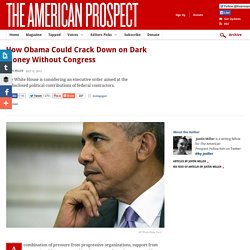
All it would take is an executive order that requires all federal contractors to disclose their dark-money spending—contributions to shadowy 501(c)(4)s and 501(c)(6) nonprofits. The only question that remains: Will he put his pen to paper? Advocates of the action argue that for Obama, this is a chance to further define his legacy on an issue that he’s notably spoken out against yet has so far refrained from any real action. At a 2010 DNC rally, Obama declared that special interest groups that pour money into attack ad campaigns without ever having to disclose their spending are “a threat to our democracy.” An outright ban on direct political contributions had kept these companies’ political influence at bay somewhat. Uk.businessinsider.
Be Afraid of the Dark: How Dark Money Affects Elections - The Accounting Degree Review. Share this infographic on your site!
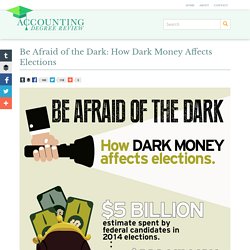
Five-fold upsurge: Super PACs, dark money groups spending far more than in ’12 cycle at same point in campaign. Louisiana Gov.
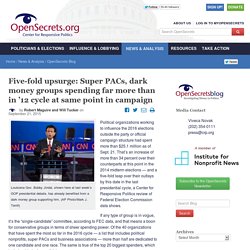
Bobby Jindal, shown here at last week’s GOP presidential debate, has already benefited from a dark money group supporting him. (AP Photo/Mark J. Terrill) Political organizations working to influence the 2016 elections outside the party or official campaign structure had spent more than $25.1 million as of Sept. 21. That’s an increase of more than 34 percent over their counterparts at this point in the 2014 midterm elections — and a five-fold leap over their outlays by this date in the last presidential cycle, a Center for Responsive Politics review of Federal Election Commission data shows. Obama Executive Order Could Reduce "Dark Money" President Obama has been denouncing “dark money” since 2010, when he declared it “a threat to our democracy.”
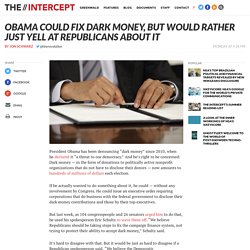
And he’s right to be concerned: Dark money — in the form of donations to politically active nonprofit organizations that do not have to disclose their donors — now amounts to hundreds of millions of dollars each election. If he actually wanted to do something about it, he could — without any involvement by Congress. He could issue an executive order requiring corporations that do business with the federal government to disclose their dark money contributions and those by their top executives. But last week, as 104 congresspeople and 26 senators urged him to do that, he used his spokesperson Eric Schultz to wave them off. “We believe Republicans should be taking steps to fix the campaign finance system, not trying to protect their ability to accept dark money,” Schultz said. It’s hard to disagree with that. There’s no question that the GOP is scared of this.